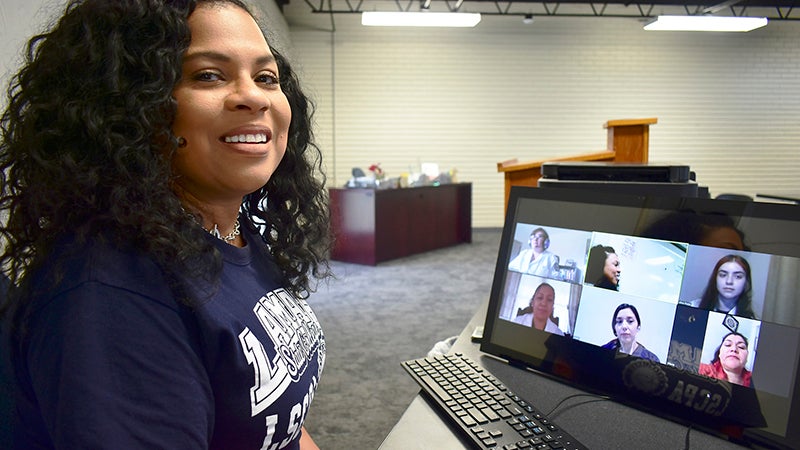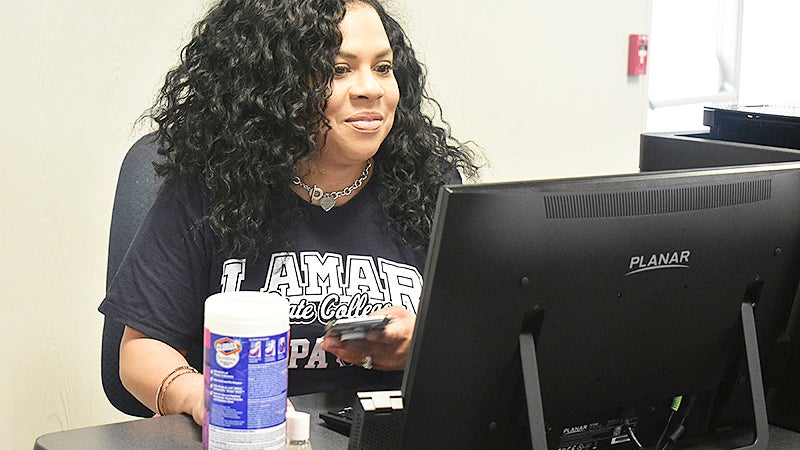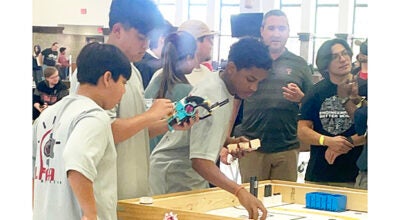Lamar State phlebotomy students raring to enter medical field in time of need
Published 12:14 am Tuesday, April 7, 2020

- Lamar State College Port Arthur phlebotomy instructor Kim Guillory communicates via Zoom videoconferencing with her students in April of 2020. Pictured on the screen, clockwise from left, Maria Enriquez, Guillory, Alma Flores, Iris Espinoza, Miriam Lopez and Antonia Guzman. (I.C. Murrell/The News) 4-2-20
|
Getting your Trinity Audio player ready...
|
Nederland resident Maria Enriquez worked as a pediatrician the last time a pandemic confronted the world.
“I know how this kind of pandemic is because I was in the last one when the H1N1 started,” said Enriquez, 40, a native of Peru. The H1N1 virus caused the swine flu that grew into a pandemic in 2009.
“Now, I know how the doctors and personnel in many hospitals are [operating] now because they were fighting with this. My intention in starting this course is to start to work in the health area. I miss my work in my country, and I think I can help many people when I start to work in the health area.”
Enriquez worked with pediatricians before coming to Southeast Texas with her husband. She and five others are working toward certification in phlebotomy through a class at Lamar State College Port Arthur funded through an Adult Education and Literacy grant from the Texas Workforce Commission.
The grant was awarded to the Region 5 Education Service Cooperative, which contacted LSCPA to provide the training, said Dr. Ben Stafford, the college’s dean of workforce training and continuing education. The students all come from Latin America and primarily speak Spanish but are learning English as well.

Lamar State College Port Arthur phlebotomy instructor Kim Guillory checks in with her students. (I.C. Murrell/The News) 4-2-20
“It’s really a great opportunity for the students,” said Kim Guillory, the class’ instructor. “The plus is that they’re Hispanic. That is a foot in the door, already. Most offices like bilingual [employees]. They not only speak English but they also speak Spanish. All six of my students speak Spanish, which is great.”
Guillory believes the coronavirus pandemic is creating a greater need for phlebotomists to assist healthcare providers. The class is meeting Mondays and Wednesdays through Zoom videoconferencing, as the LSCPA campus is closed due to the pandemic. Guillory is hopeful face-to-face instruction will resume by May so the students can take their certification test. Other than that, they can’t just jump right into the field despite the health crisis.
“If the virus continues and the precautions against the virus continue, we would set a time after the official ending of class when conditions are safe and they could learn these procedures face-to-face,” Stafford said. “You’re going to have elements that simply cannot be taught online.”
Final exams at Lamar State are scheduled to conclude May 14.
Mexican-born Antonia Guzman, 40, a Port Arthur resident, doesn’t have Enriquez’s experience but likes the class.
“We’ve learned we have to be aware of what’s happening in our city to take care of our families and our community, to follow the rules the city has given us,” Guzman said. “I think that this course is helping to understand why this is happening now. This course is going to help us know more about health. Maybe in the future, we can continue with the education and help the doctors. I know that now, the doctors need our help.”
The students range in age from Alma Flores’ 21 to Iris Espinoza’s 46. They learn about their own precautions to take while performing phlebotomy as citizens heed calls to help slow down the spread of coronavirus.
“My son has asthma, so I have to be more prepared because of his risk,” said Miriam Flores, 35, a Port Arthur resident from Mexico. “This biggest thing I’ve learned is not to be around people.”
Phlebotomy involves more than just the drawing of the blood, according to Guillory.
“They are skilled to do urine testing,” Guillory said. “For example, the coronavirus basically shows symptoms as the flu. Well, the influenza A and B is a Clearwave test where someone could go into the doctor’s office, get a nose swab and find out in minutes if they have the flu. The coronavirus basically shows symptoms as the flu.”
Clearwave testing is similar to a home pregnancy test, but it is done in a doctor’s office, Guillory said. Beyond the pandemic, she thinks a need for phlebotomists will always exist, although she realizes many jobs have been impacted.
“This pandemic we’re in right now is not only closing doors, but at the end of the day, it’s going to open doors for the healthcare,” she said.






